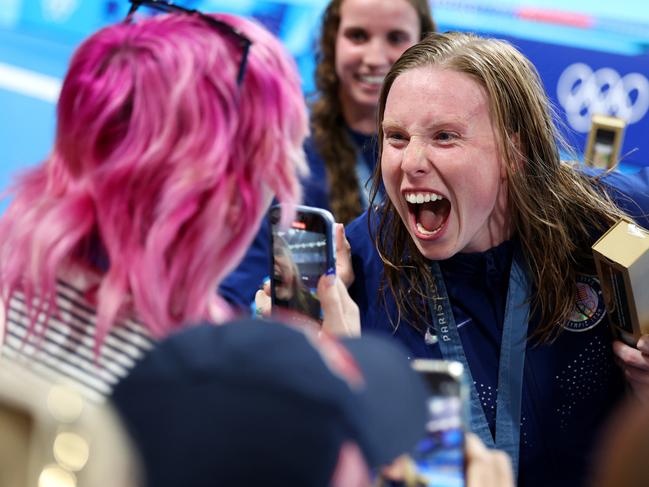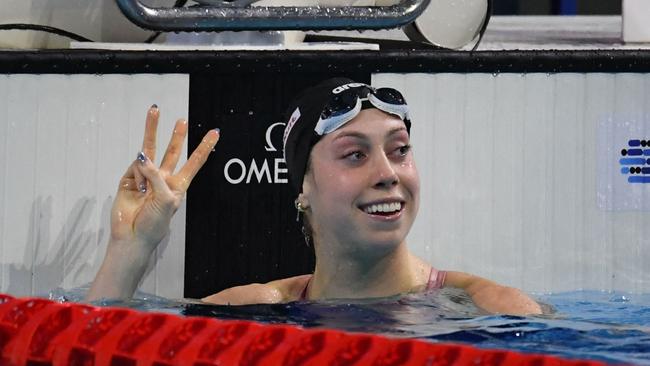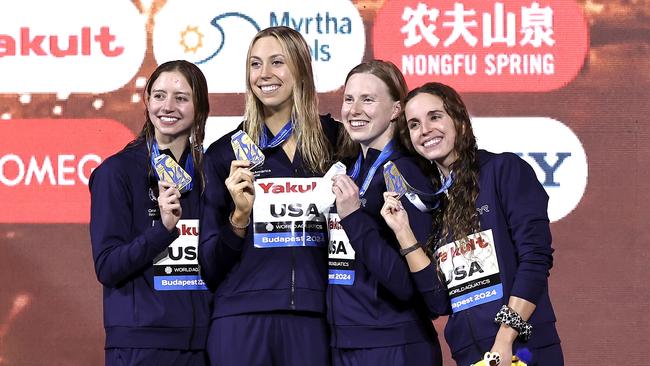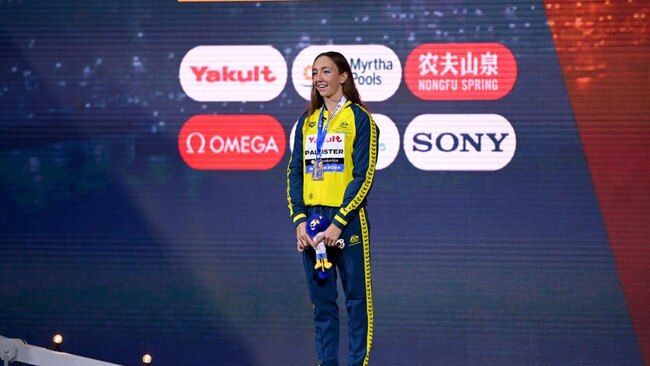America dominate the shortcourse world championships, throw down LA Games challenge to Australia
Australia’s swimmers have been put on notice – and then some. Ahead of the LA Games, the Americans have signalled their Aussie assault by breaking a stunning 21 world records.

Sport
Don't miss out on the headlines from Sport. Followed categories will be added to My News.
Already with a massive target on their backs, Australia’s champion swimmers have been given an early warning of the American backlash they can expect to face at the 2028 Los Angeles Olympics.
Terrified at the prospect of losing their place as the world’s number one swimming nation, the United States went to extreme lengths to finish ahead of the Aussies at the top of the medals table in Paris.
Secretly removing some of their best swimmers from the Paris Olympic village and switching them to a private hotel, the Americans eventually got their noses in front by winning the decisive last race in the pool in Paris.
But it was a titanic struggle, with the Yanks finishing in front of the Aussies by the barest of margins – eight gold medals to seven – and with California hosting the next Olympics, the Americans are pulling out all stops to avoid another close shave.
Leaving nothing to chance, the Americans have signalled their planned assault on the Aussies with a powerful demonstration of their team depth by winning 18 gold medals and setting 21 world records at the shortcourse world championships in Budapest.

Despite the absence of some of their biggest stars, including Katie Ledecky and Bobby Finke, the Americans destroyed their opponents in the first major international event in the long lead-up to LA.
Gretchen Walsh was the star performer, winning seven gold medals and setting 11 world records while Regan Smith and Katie Douglass each collected four gold medals in an ominous warning to the Dolphins of what’s ahead.
Just 21, Walsh pocketed $455,000 in prize money and bonuses over the six days and said she’s only getting started after juggling training with her university studies.
“I’m going to save, I’m going to invest, and I’m hopefully going to keep swimming for a long time,” Walsh said.
Her teammate Douglass said the results were a pointer to the future: “This meet, as a whole, has been so great for our entire team, and I think for a lot of swimmers around the world. This gives us a lot of momentum going into the next four years.”
The Australians finished sixth on the medals table in Hungary with two golds, won by Lani Pallister (800m freestyle) and Elijah Winnington (400m freestyle).

Missing most of their big name performers, including Kaylee McKeown, Ariarne Titmus, Mollie O’Callaghan, Kyle Chalmers and Cam McEvoy, the standings were not a clear reflection of how the Australians and Americans measure up when both teams are at full strength.
But the Aussies have still been warned they can’t rest on their laurels because 2028 will be another huge step up after Paris.
Simon Cusack, who was appointed head coach for the shortcourse world titles, said he was pleased with the performances of the Australian team, which included nine rookies being thrown into the deep end with an eye on the future.
“What you’re seeing here are the names you’re going to see on the runway to the LA Olympics.” he said.
With a smaller population and less financial backing, the Dolphins frequently punch above their weight in international waters but the team’s success also often masks areas of weakness.
The most glaring is in the stroke events other than freestyle.
While the Aussies have always excelled in ‘front crawl’, Olympic gold medals in breaststroke, butterfly and backstroke have proven harder to come by.

In the last four Olympics dating back to London 2012, just two Aussies have won gold medals in events other than freestyle, with McKeown inflating the numbers by winning the women’s 100m-200 backstroke double at Tokyo and Paris and Zac Stubblety-Cook taking out the men’s 200m breaststroke at Tokyo.
While Australia’s women have consistently climbed to the top place on the podium, victories from Aussie men have been surprisingly rare in races other than freestyle.
As astonishing as it sounds, Stubblety-Cook was the first Aussie male champion in 37 years – since John Sieben won the 200m butterfly in 1984 – and just the fifth of all time, joining Sieben, David Theile (100m backstroke), Ian O’Brien (200m breaststroke) and Kevin Berry (200m butterfly).
Originally published as America dominate the shortcourse world championships, throw down LA Games challenge to Australia



